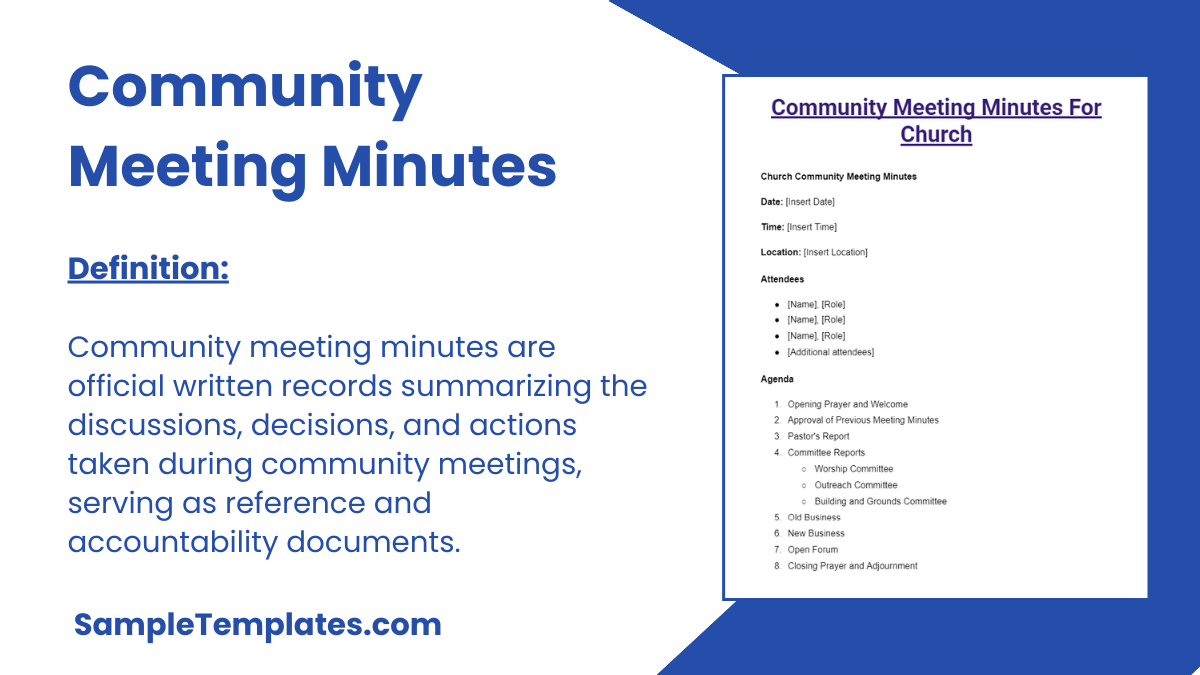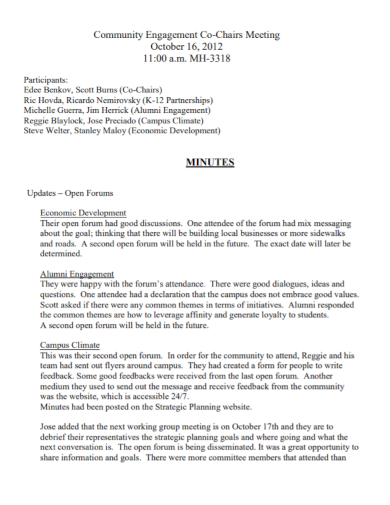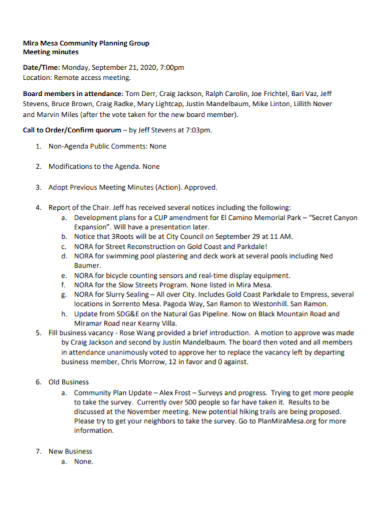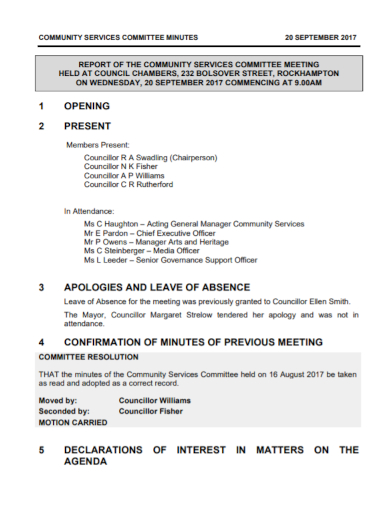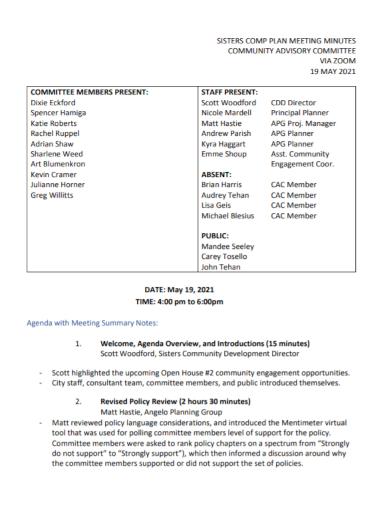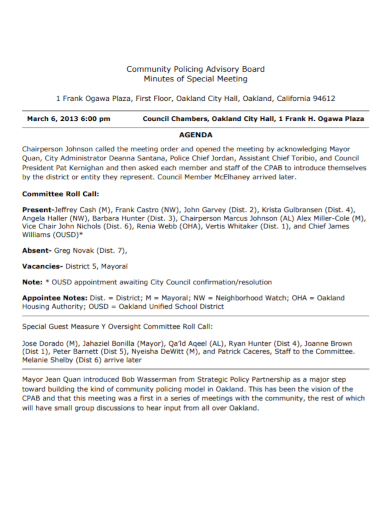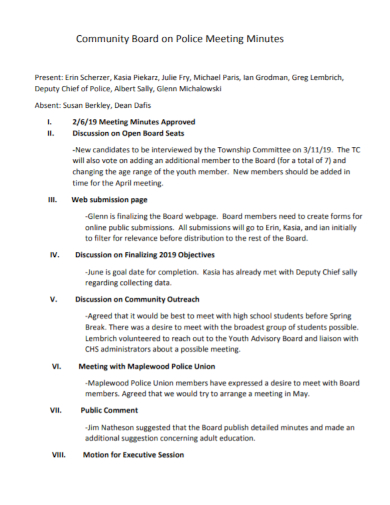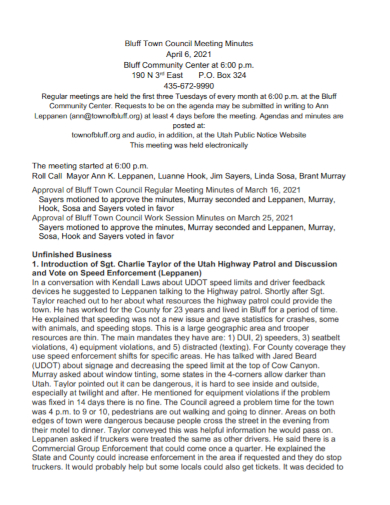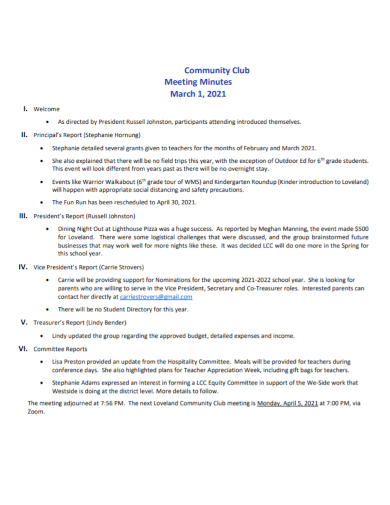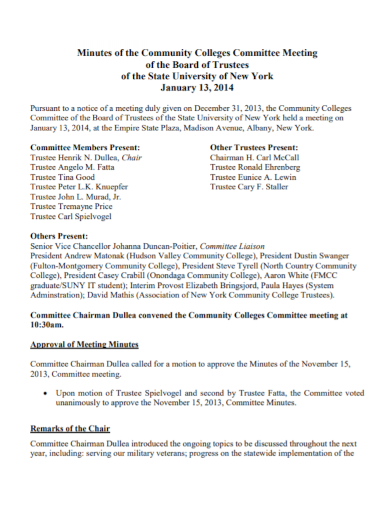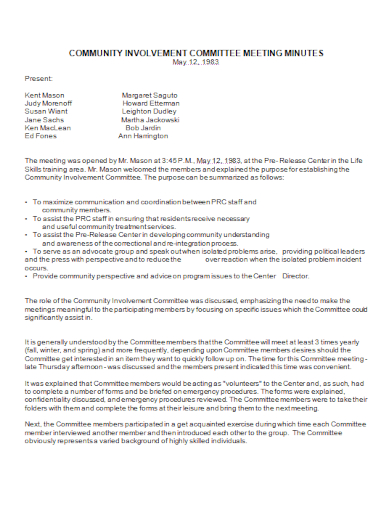If you live in an area with a close-knit population, you are likely to encounter groups or communities. Often people group due to being tied to specific geographic location, common interests, religion, and other factors. Communities are formed as an opportunity for people to socialize with one another, to form a bond to feel a sense of belongingness, something that is very essential to the human psyche. In larger communities, they are often coherent and organized by nature, especially in dealing with more members inside the group.
Hence, community meetings are often conducted to organize, inform, and raise awareness on issues that involve the members of the community. Community meetings are an opportunity for members to be able to express their opinions and grievances in the group.
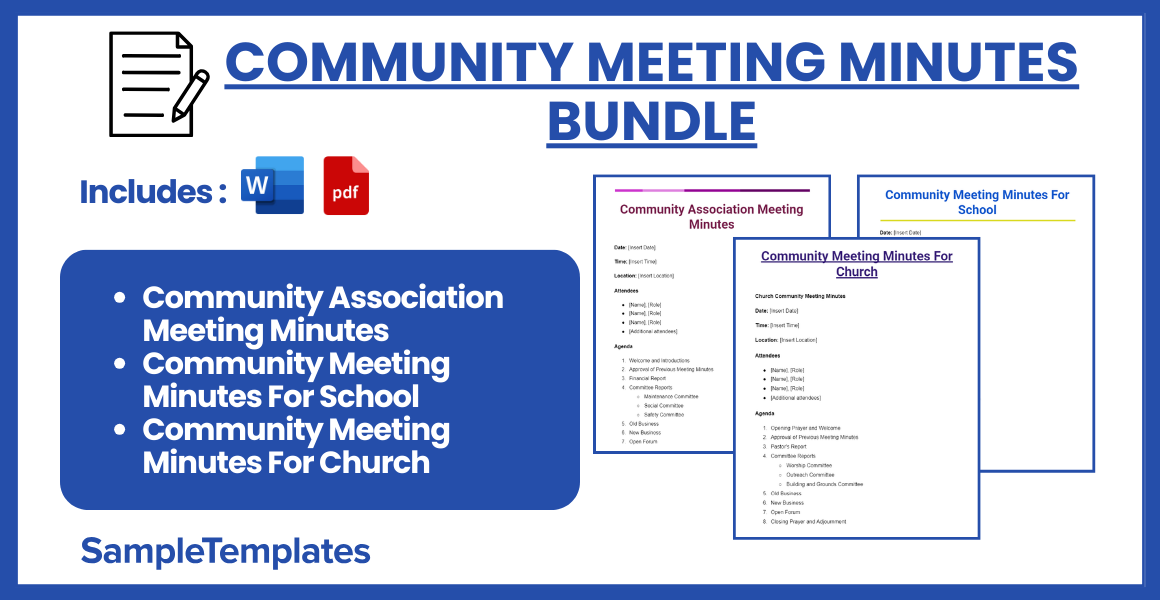
Download Community Meeting Minutes Bundle
Community Association Meeting Minutes
Date: [Insert Date]
Time: [Insert Time]
Location: [Insert Location]
Attendees
- [Name], [Role]
- [Name], [Role]
- [Name], [Role]
- [Additional attendees]
Agenda
- Welcome and Introductions
- Approval of Previous Meeting Minutes
- Financial Report
- Committee Reports
- Maintenance Committee
- Social Committee
- Safety Committee
- Old Business
- New Business
- Open Forum
- Adjournment
Minutes
- Welcome and Introductions
- Meeting called to order by [Name] at [Time].
- Introduction of attendees.
- Approval of Previous Meeting Minutes
- Motion to approve the minutes of the previous meeting by [Name].
- Seconded by [Name].
- Minutes approved unanimously.
- Financial Report
- Presented by [Treasurer’s Name].
- Overview of current financial status.
- Key expenditures and income discussed.
- Motion to approve financial report by [Name].
- Seconded by [Name].
- Financial report approved.
- Committee Reports
- Maintenance Committee
- Report on recent maintenance activities.
- Upcoming projects and budget requirements.
- Social Committee
- Summary of recent and upcoming events.
- Discussion on community engagement.
- Safety Committee
- Update on safety initiatives.
- Discussion on new safety measures.
- Maintenance Committee
- Old Business
- Follow-up on items from the previous meeting.
- Status updates and resolutions.
- New Business
- Introduction of new topics for discussion.
- Proposals and motions as required.
- Open Forum
- Community members invited to share comments, concerns, and suggestions.
- Adjournment
- Motion to adjourn by [Name].
- Seconded by [Name].
- Meeting adjourned at [Time].
Next Meeting
- Date: [Insert Date]
- Time: [Insert Time]
- Location: [Insert Location]
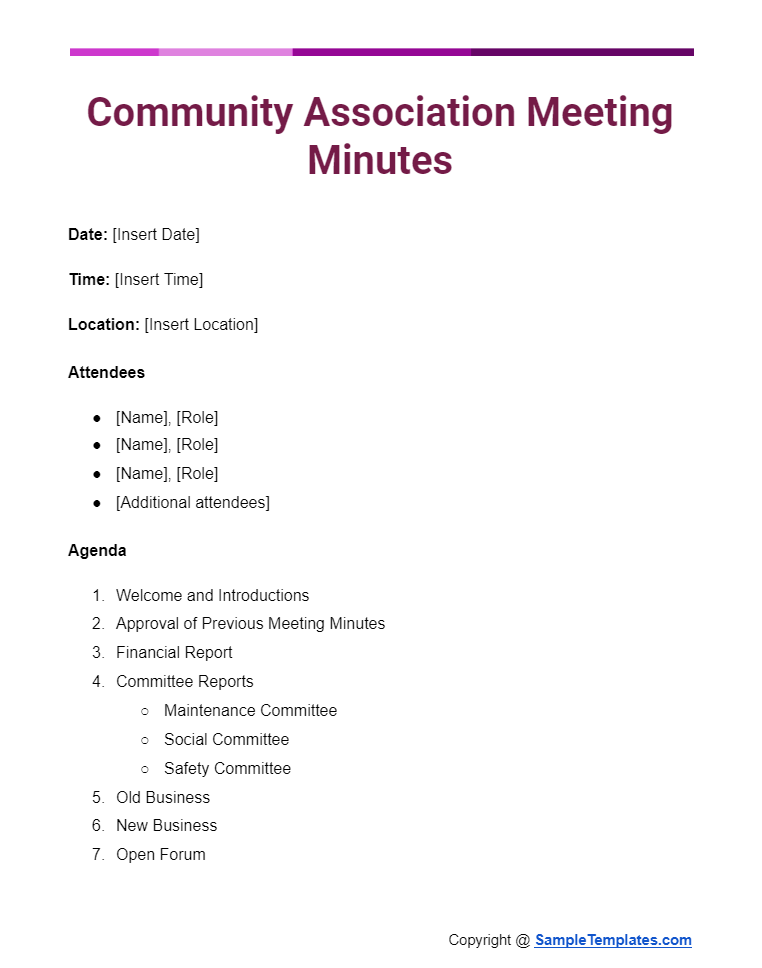
Community Meeting Minutes For School
Date: [Insert Date]
Time: [Insert Time]
Location: [Insert Location]
Attendees
- [Name], [Role]
- [Name], [Role]
- [Name], [Role]
- [Additional attendees]
Agenda
- Welcome and Introductions
- Approval of Previous Meeting Minutes
- Principal’s Report
- Committee Reports
- Academic Committee
- Extracurricular Committee
- Safety and Facilities Committee
- Old Business
- New Business
- Open Forum
- Adjournment
Minutes
- Welcome and Introductions
- Meeting called to order by [Name] at [Time].
- Introduction of attendees.
- Approval of Previous Meeting Minutes
- Motion to approve the minutes of the previous meeting by [Name].
- Seconded by [Name].
- Minutes approved unanimously.
- Principal’s Report
- Presented by [Principal’s Name].
- Overview of recent school activities and updates.
- Discussion on student performance and upcoming events.
- Key announcements and initiatives.
- Committee Reports
- Academic Committee
- Report on academic performance and initiatives.
- Updates on curriculum changes and upcoming assessments.
- Extracurricular Committee
- Summary of recent and planned extracurricular activities.
- Discussion on student participation and new programs.
- Safety and Facilities Committee
- Update on safety measures and facility improvements.
- Discussion on maintenance issues and future plans.
- Academic Committee
- Old Business
- Follow-up on items from the previous meeting.
- Status updates and resolutions.
- New Business
- Introduction of new topics for discussion.
- Proposals and motions as required.
- Open Forum
- Community members invited to share comments, concerns, and suggestions.
- Adjournment
- Motion to adjourn by [Name].
- Seconded by [Name].
- Meeting adjourned at [Time].
Next Meeting
- Date: [Insert Date]
- Time: [Insert Time]
- Location: [Insert Location]
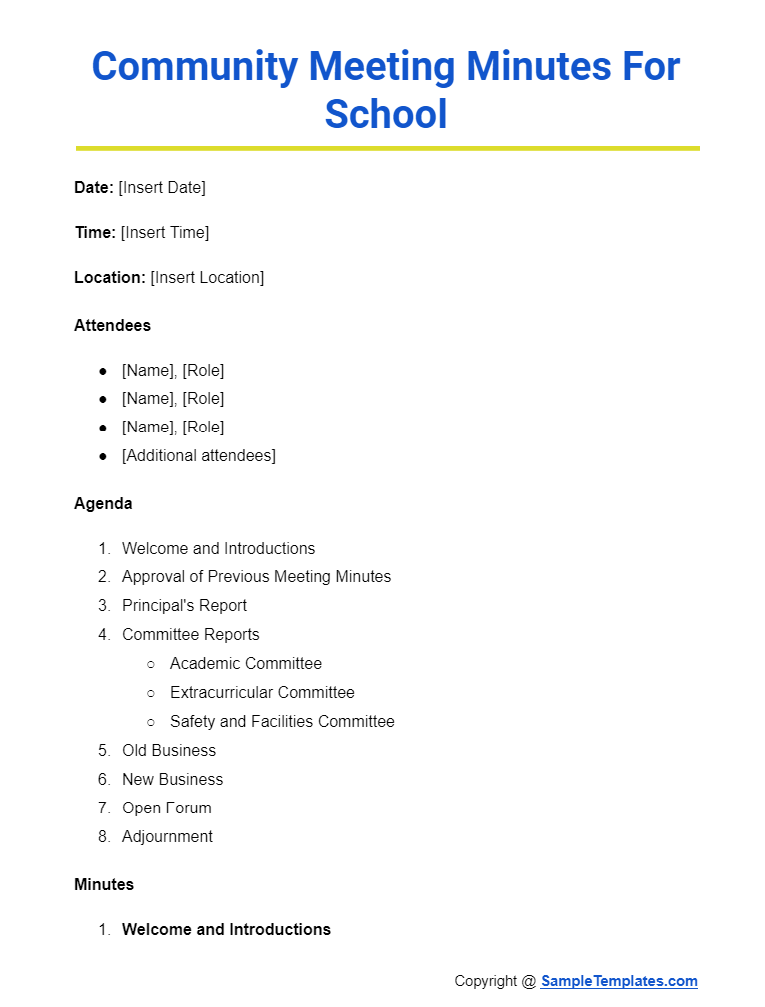
Community Meeting Minutes For Church
Church Community Meeting Minutes
Date: [Insert Date]
Time: [Insert Time]
Location: [Insert Location]
Attendees
- [Name], [Role]
- [Name], [Role]
- [Name], [Role]
- [Additional attendees]
Agenda
- Opening Prayer and Welcome
- Approval of Previous Meeting Minutes
- Pastor’s Report
- Committee Reports
- Worship Committee
- Outreach Committee
- Building and Grounds Committee
- Old Business
- New Business
- Open Forum
- Closing Prayer and Adjournment
Minutes
- Opening Prayer and Welcome
- Meeting called to order by [Name] at [Time].
- Opening prayer led by [Name].
- Welcome and introduction of attendees.
- Approval of Previous Meeting Minutes
- Motion to approve the minutes of the previous meeting by [Name].
- Seconded by [Name].
- Minutes approved unanimously.
- Pastor’s Report
- Presented by [Pastor’s Name].
- Overview of recent church activities and updates.
- Discussion on spiritual growth and upcoming events.
- Key announcements and initiatives.
- Committee Reports
- Worship Committee
- Report on recent worship services and plans for future services.
- Discussion on worship team needs and volunteer opportunities.
- Outreach Committee
- Summary of recent outreach activities and upcoming community service projects.
- Discussion on ways to increase community engagement.
- Building and Grounds Committee
- Update on maintenance issues and facility improvements.
- Discussion on future projects and budget requirements.
- Worship Committee
- Old Business
- Follow-up on items from the previous meeting.
- Status updates and resolutions.
- New Business
- Introduction of new topics for discussion.
- Proposals and motions as required.
- Open Forum
- Community members invited to share comments, concerns, and suggestions.
- Closing Prayer and Adjournment
- Closing prayer led by [Name].
- Motion to adjourn by [Name].
- Seconded by [Name].
- Meeting adjourned at [Time].
Next Meeting
- Date: [Insert Date]
- Time: [Insert Time]
- Location: [Insert Location]
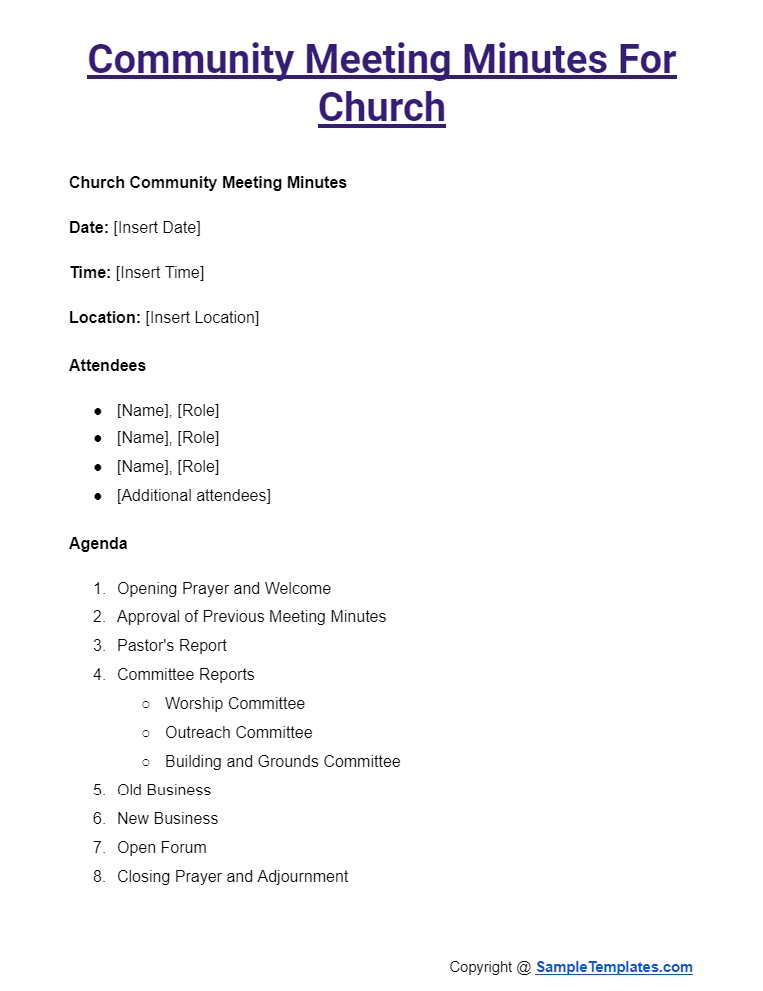
Browse More Templates On Community Meeting Minutes
1. Community Project Meeting Minutes
2. Community Engagement Meeting Minutes
3. Community Group Meeting Minutes
How to Write a Community Meeting Minutes?
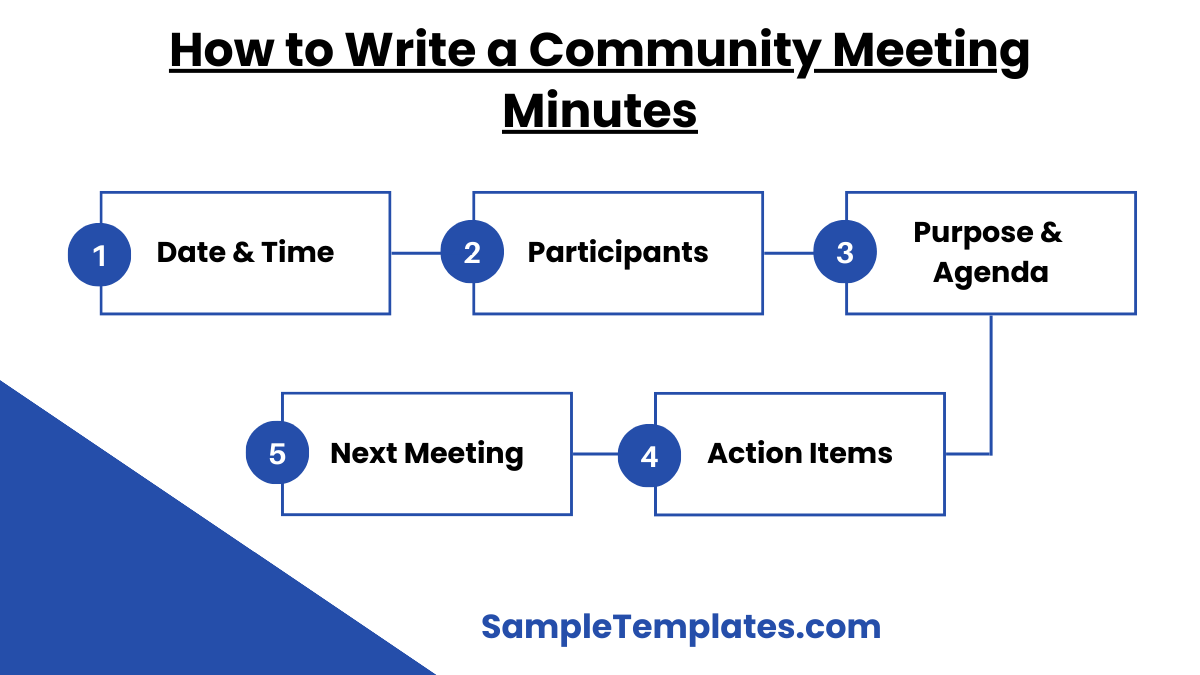
Here are some of the details that you should put into the meeting minutes:
1. Date and Time of the Meeting
Before you actually start writing your meeting minutes, note the date and time of the meeting.
2. Names of the Participants
The next step is to document the names of all of the participants and any other people who weren’t able to attend. Usually, at the beginning of the meeting, there’s some time dedicated to the acceptance or amendment to previous meeting minutes so you can take a look at who attended last time to have a draft version of an attendee list. Better yet, use the calendar invite to check names as participants join or enter the room.
3. Purpose and Agenda Items and Topics Discussed
In this part of the meeting minutes, try to be detailed in explaining why this meeting was called and what it’s trying to achieve. This is going to especially be useful for any individuals who were unable to attend the meeting and for anyone who is using the outcomes of this meeting to make decisions. Try using your meeting agenda as a general outline for your meeting notes and use each agenda item as a section to record notes on; including any outcomes or major decisions that have been made.
4. Action Items
Productive meetings result in assigning action items to different participants. Record any decisions or action items as soon as they happen so that you can transcribe them accurately. Capturing everything would be impossible, so instead, listen for actions that need to be made about major decisions, recommendations, challenges, or solutions that have been identified.
5. Next Meeting Date and Place
If you’re taking formal meeting minutes, the meeting attendees need to know when they call to order for the next meeting is, about this sample project or topic of discussion. Understanding when you’re meeting next is going to help you manage your time appropriately and prioritize all of your tasks appropriately. It’s also important to know the place of your meeting so don’t forget to mention it to the attendees.
4. Community Services Meeting Minutes
5. Community Advisory Meeting Minutes
6. Community Policy Meeting Minutes
Tips For Writing a Community Meeting Minutes
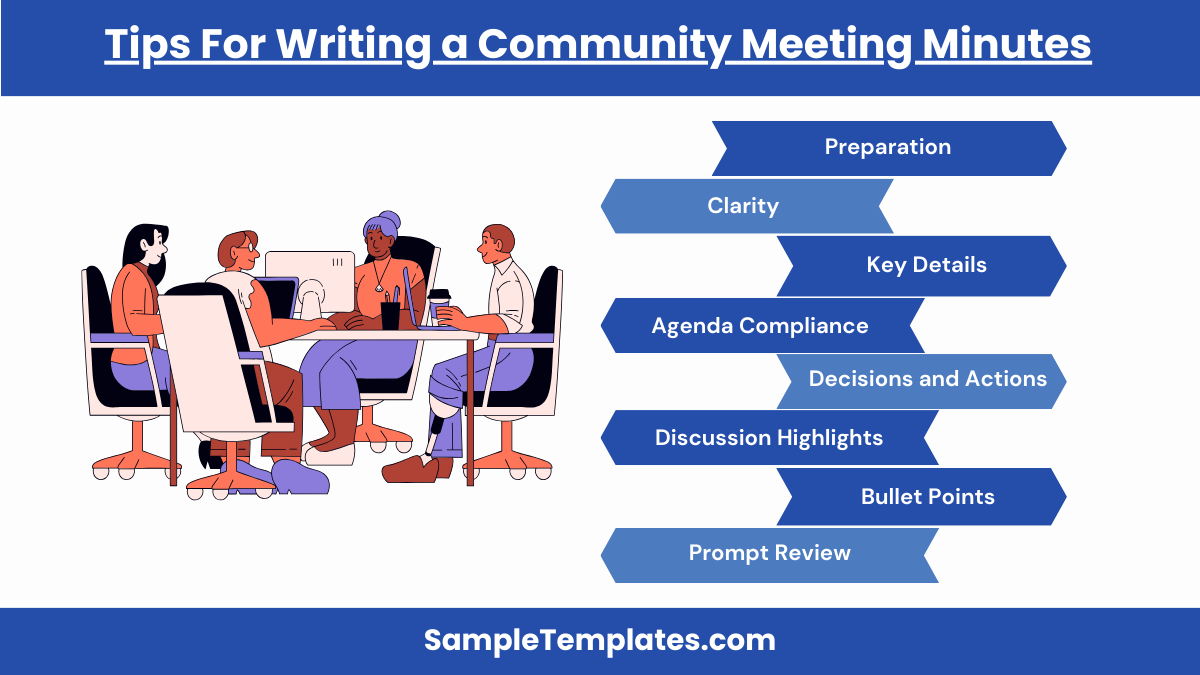
- Prepare in Advance:
- Familiarize yourself with the meeting agenda and attendees.
- Have a template ready to fill in during the meeting to ensure all necessary sections are covered.
- Be Concise and Clear:
- Summarize discussions and decisions without including every detail.
- Use clear and straightforward language to ensure the minutes are easy to read and understand.
- Record Key Details:
- Include the date, time, and location of the meeting.
- List the names and roles of attendees, noting any absentees.
- Follow the Agenda:
- Structure the minutes according to the agenda items.
- Address each topic in the order it was discussed to maintain coherence and organization.
- Capture Decisions and Actions:
- Clearly state the decisions made and actions agreed upon.
- Assign responsibilities and deadlines for each action item.
- Note Important Discussions:
- Summarize key points of discussions, especially those that influence decisions.
- Highlight any differing opinions and how they were resolved.
- Use Bullet Points:
- Utilize bullet points for lists and action items to enhance readability.
- This helps in quickly identifying key information.
- Review and Distribute Promptly:
- Review the minutes for accuracy and completeness shortly after the meeting.
- Distribute the finalized minutes to all attendees and relevant parties promptly, typically within a few days of the meeting.
7. Community Board Meeting Minutes
8. Community Council Meeting Minutes
9. Community Club Meeting Minutes
10. Community College Meeting Minutes
11. Community Committee Meeting Minutes
What are Community Meeting Minutes?
Community meetings are meticulous and planned. To successfully disseminate information or concerns to the members, community meetings have to be cohesive, have a target goal, and avoid disinterest among the members of the community. In creating community meetings, one must note how essential it is in hitting the goal of informing the members properly. Below is a list of templates that can be very helpful in organizing Community meetings.
Meeting minutes are the notes that capture what happened at a meeting. It records the decisions made and actions requested by the group. They are an important source of information for people who were unable to attend or looking back to reflect on what happened. It’s important in meeting minutes to capture information such as the decisions made by the community, the agreed steps to take, the action items and their timelines, and who are responsible to do it.
FAQs
What is the most difficult part in writing the minutes of the meeting?
The most difficult part of writing the meeting minutes is determining which relevant information must be written down and what to leave out. When writing the minutes, remember the agenda of the meeting, and only take note of the discussion related to it.
Who is usually the person who takes the minutes of a meeting?
The person who takes minutes is usually a secretary, a scribe, or a notetaker.
What are the three types of minutes?
The three types of minutes are action, discussion, and verbatim.
It’s important to document as much information as possible and keep the meeting format consistent from meeting to meeting. Notes should be brief and to the point. Important decisions and actions should be recorded on the template or notepad as they happen. Circulate an attendance list to record who was present at the meeting. If a list of expected attendees is prepared before the meeting, names can be checked off as people arrive. Record any motions made and the names of people who originated them.
Take note of whether motions were adopted or rejected and which voting method was used. Minutes should be written in an objective tone, without the private opinions or editorializations of the minute-taker. Meeting minutes must be accurate because they can be a legal record of proceedings and actions of an organization. Knowing how to take meeting minutes accurately is a valuable business skill. To help you get started, download our free sample templates provided above!
Related Posts
FREE 11+ Sample Meeting Summary
FREE 10+ Strategy Meeting Agenda Samples
FREE 10+ Committee Meeting Agenda Samples
FREE 9+ Group Project Proposal Samples
FREE 9+ Sample Needs Assessment Survey
FREE 7+ Sample Needs Assessment
FREE 6+ Useful Meeting Notes Templates
FREE 4+ Staff Meeting Agenda Samples
Business Agendas for Small and Medium Enterprises
FREE 30+ Meeting Agenda Samples
FREE 11+ Board Meeting Agenda Templates
FREE 11+ Biweekly Timesheet Calculators
FREE 9+ Team Meeting Agenda Samples
FREE 8+ Meeting Action List Samples
FREE 7+ Community Petition
